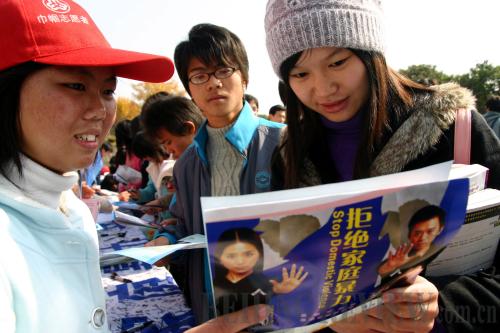|
 |
|
NO VIOLENCE! Young Volunteers from Chaohu University deliver the promotional materials on stopping domestic violence in Anhui Province, on November 25, 2008. The day is the International Day for the Elimination of Violence Against Women (XINHUA) |
A two-day seminar on legislation aimed at curbing domestic violence was held in Nanjing in east China's Jiangsu Province on December 9-11, 2009.
Foreign and domestic experts discussed a proposed law on the prevention and control of domestic violence that was drafted by the All-China Women's Federation (ACWF).
Jiang Yue'e, Director of the Department for Women's Rights and Interests under the ACWF, said the federation received up to 50,000 complaints annually on domestic violence from 2004 to 2008, about 10 percent of all that they registered, and the number has been increasing in recent years.
"Domestic violence is a serious problem facing women and children and has grown into a potential threat to social stability," she said.
Serious condition
According to statistics from the World Women's Organization, at least one fifth of families around the world experience violence.
In China, this number is higher. The ACWF said last year that violence affected almost 30 percent of the 270 million Chinese families. It said that more than 90 percent of perpetrators are men and nearly 100,000 homes are broken up every year in the country due to domestic violence.
The Beijing Municipal Government said in March 2009 that family violence cases had increased by 20 percent in the city over the previous three years.
"About 10 percent of cases in our law firm last year were divorces, with more than 30 percent being related to domestic violence," said Guo Wenqing, a lawyer at Beijing's Junyong Law Firm.
Jiang said domestic violence occurs in both cities and rural areas, where about 800 million people live.
She said that rural Chinese women, especially those who have relocated to cities, are susceptible to family violence. A survey conducted by the ACWF in 2006 showed that 12 percent of female respondents in rural areas said they had fought with their husbands during the previous year, while the proportion rose to 14 percent when looking at women who had come from the countryside but were presently working in cities.
"Female migrant workers are restricted in accessing legal assistance as they are constantly on the move," Jiang said. "Divorce is more costly for them to use as a way to escape from family violence than women from urban areas."
Domestic violence also takes place among those who are more highly educated, Jiang said. In 2003, the Maple Women's Psychological Counseling Center, a Beijing-based non-governmental organization (NGO), investigated 100 documented cases of physical abuse inflicted by men against their wives. The survey showed that 62 percent of perpetrators and 35 percent of victims had received higher education.
Jiang said domestic violence has spread to younger age groups since the post-1980s generations have begun reaching marriage age.
"Those born after the 1980s have a higher average level of education. They tend to use psychological abuse rather than physical abuse," she said.
On December 6, 2009, the first campus union against domestic violence was set up by eight universities in Beijing to deal with violent relationships.
| 